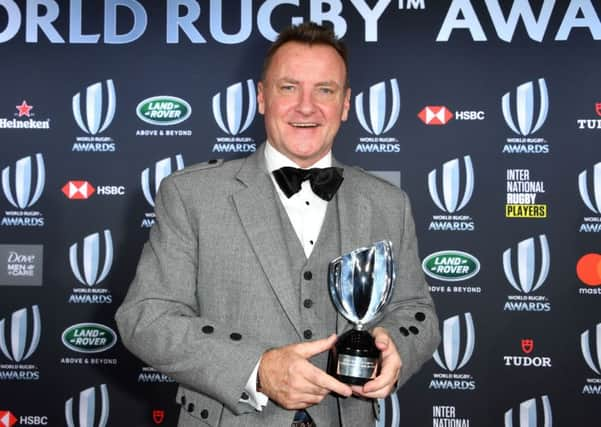Pioneer Jamie Armstrong wins World Rugby's Spirit of Rugby Award


In his usual garish outfit, Doddie Weir accepted an award for being a character in the game, and for his tireless fundraising work for the MND charity he founded, while Jamie Armstrong accepted his “Spirit of Rugby” award sporting a more traditional kilt.
Armstrong was being recognised by the game’s governing body for setting up Trust Rugby International (Tri), an organisation that facilitates mixed-ability (“unified”) rugby “clans” incorporating roughly equal numbers of regular players and those with learning difficulties.
Advertisement
Hide AdAdvertisement
Hide Ad“I swore when the announcement was made,” says the Scot. “I wasn’t even expecting to be there let alone win it because of the work [fellow nominee] Harinder [Singh] is doing in India. It is testament to the work of so many others, especially Dr Helen Lynn who was the clinical director for disability at Ayrshire and Arran NHS trust. She passed away from cancer earlier this year, but she was the one who inspired me and said, ‘right, let’s do this’ when I proposed unified rugby. If it wasn’t for her we wouldn’t have a clan in Scotland.”
For reasons only they know, Scottish Rugby chose not to trumpet this triumph, which is an odd one because Murrayfield help facilitate Tri Rugby, contributing a healthy and very welcome £10,000 last year.
Armstrong is the instigator and driving force behind Tri Rugby – “chief cook and bottle washer” is how he puts it, although that may be about to change as he steps back from the organisation he started and has run for the last six years.
“Not so much stepping backwards as stepping sideways,” he corrects me. “The trouble is that I never saw Tri Rugby as an organisation, it was set up as a project back in 2012 when we raised just £12,000. Last year we had a budget of £160,000 which is a massive jump. We are planning six regional centres throughout Scotland in line with Scottish Rugby’s grid. It has grown organically so far but we need to plan for the future.
“I don’t like to put myself centre stage but if I was to disappear tomorrow, so would Tri Rugby. We need to put structures in place to make the organisation sustainable in the long term so that is what we are trying to do.”
If Scotland has “unified rugby”, the English equivalent is “mixed ability rugby” and under a joint initiative, “Project Rugby”, between the RFU and Premiership Rugby, every top flight club in England has teamed up with a mixed ability club to mentor and nurture them.
Armstrong’s next move is to have the Super Six clubs do the same thing – mentor a unified team – and he is already working with Heriot’s on the idea. After that, Tri Rugby is aiming to field a unified women’s squad in Scotland by the middle of next year, requiring 10 enablers and 10 players with learning difficulties.
Tri Rugby has an excellent relationship with Worcester Warriors, and the Midlands club has already offered to host Scotland’s first unified women’s team.
Advertisement
Hide AdAdvertisement
Hide AdFor their part Worcester have introduced Armstrong to “Hugby”, a wonderful-sounding version of the game for the visually impaired. I confess to Armstrong that I am a little sceptical on the practicalities of how Hugby functions on the field. “I’ve seen it and it works,” he replies with customary enthusiasm, “It totally works!”
And with that Armstrong is off to change the world, one disbeliever at a time.